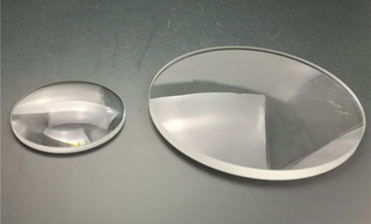What are the Characteristics and Applications of Camera Lenses?
As a Dome lens Manufacturer, share with you. Standard lens: A standard lens is a lens with a focal length equal to or close to the diagonal length of the camera frame.
The "standard" range taken by the camera's zoom lens refers to the angle of field of view of the lens that approximates the angle at which people view the TV screen. If the distance between the viewer and the image is exactly enough to make him distinguish the finest part of the TV program, the angle between the fluorescent screen and his eyes are about 24 °, so we set the field of view 24 ° as the "standard" Shot.
Plano Convex Lenses
The advantages of standard lenses: The imaging effect is similar to the visual experience of the human eye. The space and perspective of the image and the relative size of the object also conform to human visual habits.
Wide-angle lens: A wide-angle lens is a lens with a focal length that is shorter than the angle of view than a standard lens. For cameras, a field of view greater than 30 ° is called a wide-angle lens.
Characteristics of wide-angle lenses:
1. The viewing angle is larger than the standard lens. The shorter the focal length, the larger the viewing angle.
2. Wide-angle lenses can produce a larger depth of field.
3. Change the normal perspective relationship.
4. The image is distorted, especially at the edges of the screen.
Application of wide-angle lens:
1. Suitable for taking panoramic pictures of long-distance views.
2. It is suitable for taking deep pictures of multiple scenes in the depth direction.
3. Suitable for snapping and shooting fast moving bodies in emergency situations.
4. Suitable for taking close-up shots of subjects that emphasize environmental relationships.
5. Suitable for shooting in an environment where the shooting position is restricted by a narrow space and cannot be retreated.
6. Suitable for discarding the bad prospects before the subject.
7. Suitable for shooting occasions where the picture is expected to have perspective distortion.
8. When the subject's image magnification is fixed, the inner side of the three-dimensional scene is better displayed.
9. When the image magnification of the starting position of the subject is fixed, the subject moving in the depth direction can have a strong sense of motion in the picture.
10. When the subject's image magnification is fixed, the motion effect of the lateral moving body in the foreground is obviously exaggerated; the motion effect of the lateral moving body in the background is obviously weakened.
11. When handheld photography or sports photography, it is conducive to shooting a more stable picture effect.
12. The wide-angle lens has a wide field of view, and the brightness of the shooting scene varies greatly.
Telephoto lens: A telephoto lens is a lens that has a larger focal length and a smaller angle of view than a standard lens. For the camera, the field of view angle is less than 15 °, and the nearest imaging point should be about 1 m.
Features of the telephoto lens:
1. The viewing angle is small, and the distant scenery can be "closed".
2. The depth of field is small, you can get the effect of combining reality and reality.
3. Generate the perspective effect of "space compression".
4. Image distortion is small.
5. The tones and tones of the image are relatively soft.
6. The image field illumination is relatively uniform.
Our company also has Plano Convex Lenses on sale, welcome to consult.

评论
发表评论